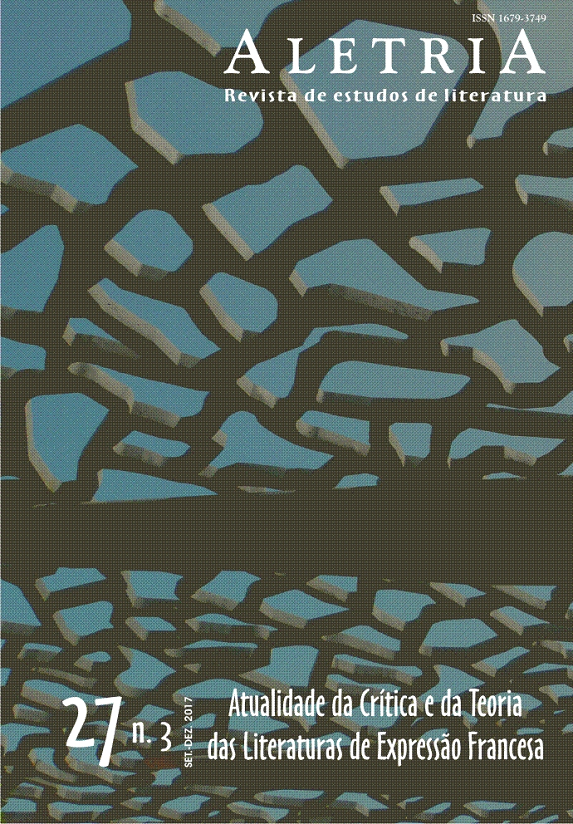A Never-Ending Road to Ithaca: The Presence and the Absence of Writing in Contempt, by Jean-Luc Godard, 1963
DOI:
https://doi.org/10.17851/2317-2096.27.3.175-192Keywords:
Jean-Luc Godard, Contempt, adaptation, cinema and writing, intermedialityAbstract
This article analyses the correspondences between the speculations about cinema and the role of the writing instances in the film Contempt (1963), in order to understand how this presence fulfills, but at the same time destabilizes, the issue of adaptation. Examining the writing in this film through these modalities allows one to conclude that Homer’s epic poem here is limited to a circuit of allusions and subscriptions that suggest that the cinematic adaptation of the Odyssey “preferred not to be written”, and also attest that it “resists” to an unequivocal idea of “text”, reflecting about cinema both through the presence and the absence of writing.
Downloads
References
ADAMS, Ross Exo. Foreground, Background, Drama: The Cinematic Space of Le Mépris. In: MACCABE, Colin; MULVEY, Laura (Ed.). Godard’s Contempt: Essays from the London Consortium. Oxford: Blackwell Publishing, 2012. p. 14-28.
AUMONT, Jacques. Moderno? Por que o cinema se tornou a mais singular das artes. Campinas: Papirus, 2008.
BAZIN, André. O Journal d’un curé de campagne e a estilística de Robert Bresson. In: BAZIN, André. O cinema: ensaios. São Paulo: Brasilense, 1991. p. 105-122.
BELLOUR, Raymond. (Not) Just an Other Filmmaker. In: BELLOUR, Raymond; BANDY, Mary Lea (Ed.). Jean-Luc Godard: son-image 1974-1991. New York: The Museum of Modern Art, 1992. p. 215-231.
CERISUELO, Marc. Le Mépris. Chatou: Les Éditions de la Transparence, 2006.
COUTINHO, Mário Alves. Escrever com a câmera: cinema e literatura na obra de Jean-Luc Godard. Belo Horizonte: Faculdade de Letras da UFMG, 2007.
HAYES, Kevin. The Body and the Book in Contempt. Studies in European Cinema, Abingdon, v. 1, n. 1, p. 31-41, 2004.
LE MÉPRIS. Direção de Jean-Luc Godard. Paris: Les Films Concordia, 1963. 1 DVD, 102 min.
MACAUX, Emily. A Postmodern Consideration of Jean-Luc Godard’s Le Mépris. In: CONLEY, Tom; KLINE, T. Jefferson (Ed.). A Companion to Jean-Luc Godard. Malden; Oxford: Wiley-Blackwell, 2014. p. 128-142. doi: https://doi.org/10.1002/9781118586815.ch9
MACCABE, Colin. Godard: A Portrait of the Artist at 70. London: Bloomsbury, 2003.
MACCABE, Colin. Introduction: Essays from the London Consortium. In: MACCABE, Colin; MULVEY, Laura (Ed.). Godard’s Contempt: Essays from the London Consortium. Oxford: Blackwell Publishing, 2012. p. 1-13.
MULVEY, Laura. Le Mépris (Jean-Luc Godard 1963) and Its Story of Cinema: A ‘Fabric of Quotations’. In: MACCABE, Colin; MULVEY, Laura (Ed.). Godard’s Contempt: Essays from the London Consortium. Oxford: Blackwell Publishing, 2012. p. 225-237.
PETHŐ, Ágnes. Cinema and Intermediality: The Passion for the In-Between. Newcastle upon Tyne: Cambridge Scholars, 2011.
RANCIÈRE, Jacques. Os intervalos do cinema. Lisboa: Orfeu Negro, 2012.
RODOWICK, David N. Reading the Figural, or, Philosophy after the New Media. Durham: Duke University Press, 2001.
ROWLAND, Clara. Ser sombra entre sombras: inscrição e circuito no cinema de Pedro Costa. In: ROWLAND, Clara; BÉRTOLO, José (Org.). A escrita do cinema: ensaios. Lisboa: Documenta, 2015. p. 207-221.
VINEY, William. “Not Necessarily in That Order”: Contempt, Adaptation and the Metacinematic. In: MACCABE, Colin; MULVEY, Laura (Ed.). Godard’s Contempt: Essays from the London Consortium. Oxford: Blackwell Publishing, 2012. p. 148-156.
Downloads
Additional Files
Published
How to Cite
Issue
Section
License
Copyright (c) 2017 Bruno Fontes (Autor)

This work is licensed under a Creative Commons Attribution 4.0 International License.
Authors who publish with this journal agree to the following terms:Authors retain copyright and grant the journal right of first publication with the work simultaneously licensed under a Creative Commons Attribution Non-Commercial No Derivatives License that allows others to share the work with an acknowledgement of the work's authorship and initial publication in this journal.Authors are able to enter into separate, additional contractual arrangements for the non-exclusive distribution of the journal's published version of the work (e.g., post it to an institutional repository or publish it in a book), with an acknowledgement of its initial publication in this journal.Authors are permitted and encouraged to post their work online (e.g., in institutional repositories or on their website) prior to and during the submission process, as it can lead to productive exchanges, as well as earlier and greater citation of published work (See The Effect of Open Access).





